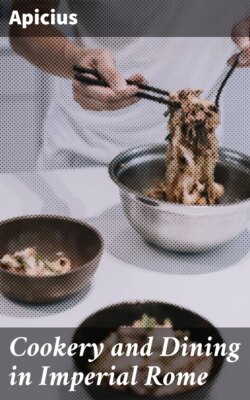Читать книгу Cookery and Dining in Imperial Rome - Apicius - Страница 23
На сайте Литреса книга снята с продажи.
Probably of Greek Parentage
ОглавлениеTable of Contents
We may as well add another to the many speculations by saying that it is quite probable for our book to originate in a number of Greek manuals or monographs on specialized subjects or departments of cookery. Such special treatises are mentioned by Athenaeus (cf. Humelbergius, quoted by Lister). The titles of each chapter (or book) are in Greek, the text is full of Greek terminology. While classification under the respective titles is not strictly adhered to at all times, it is significant that certain subjects, that of fish cookery, for instance, appear twice in the book, the same subject showing treatment by widely different hands. Still more significant is the absence in our book of such important departments as desserts—dulcia—confections in which the ancients were experts. Bakery, too, even the plainest kind, is conspicuously absent in the Apician books. The latter two trades being particularly well developed, were departmentalized to an astonishing degree in ancient Greece and Rome. These indispensable books are simply wanting in our book if it be but a collection of Greek monographs. Roman culture and refinement of living, commencing about 200–250 years before our era was under the complete rule of Hellas. Greek influence included everybody from philosophers, artists, architects, actors, law-makers to cooks.
“The conquered thus conquered the conquerors.”
Humelbergius makes a significant reference to the origin of Apicius. We confess, we have not checked up this worthy editor nor his successor, Dr. Lister, whom he quotes in the preface as to the origin of our book. With reference to Plato’s work, Humelbergius says:
“Que res tota spectat medicinæ partem, quæ diaitetike appelatur, et victu medetur: at in hac tes diaitetikes parte totus est Apicius noster.”
In our opinion, unfounded of course by positive proof, the Apicius book is somewhat of a gastronomic bible, consisting of ten different books by several authors, originating in Greece and taken over by the Romans along with the rest of Greek culture as spoils of war. These books, or chapters, or fragments thereof, must have been in vogue long before they were collected and assembled in the present form. Editions, or copies of the same must have been numerous, either singly or collectively, at the beginning of our era. As a matter of fact, the Excerpts by Vinidarius, found in the codex Salmasianus prove this theory and give rise to the assumption that the Apicius book was a standard work for cookery that existed at one time or other in a far more copious volume and that the present Apicius is but a fragment of a formerly vaster and more complete collection of culinary and medical formulæ.
Thus a fragmentary Apicius has been handed down to us in manuscript form through the centuries, through the revolutionary era of Christian ascendancy, through the dark ages down to the Renaissance. Unknown agencies, mostly medical and monastic, stout custodians of antique learning, reverent lovers of good cheer have preserved it for us until printing made possible the book’s wide distribution among the scholars. Just prior to Gutenberg’s epoch-making printing press there was a spurt of interest in our book in Italy, as attested to by a dozen of manuscripts, copied in the fourteenth and the fifteenth centuries.
Apicius may justly be called the world’s oldest cookery book; the very old Sanscrit book, Vasavarayeyam, unknown to us except by name, is said to be a tract on vegetarian cookery.
The men who have preserved this work for future generations, who have made it accessible to the public (as was Lister’s intention) have performed a service to civilization that is not to be underestimated. They have done better than the average archaeologist with one or another find to his credit. The Apicius book is a living thing, capable of creating happiness. Some gastronomic writers have pointed out that the man who discovers a new dish does more for humanity than the man who discovers a new star, because the discovery of a new dish affects the happiness of mankind more pleasantly than the addition of a new planet to an already overcrowded chart of the universe. Viewing Apicius from such a materialistic point of view he should become very popular in this age of ours so keen for utilities of every sort.
